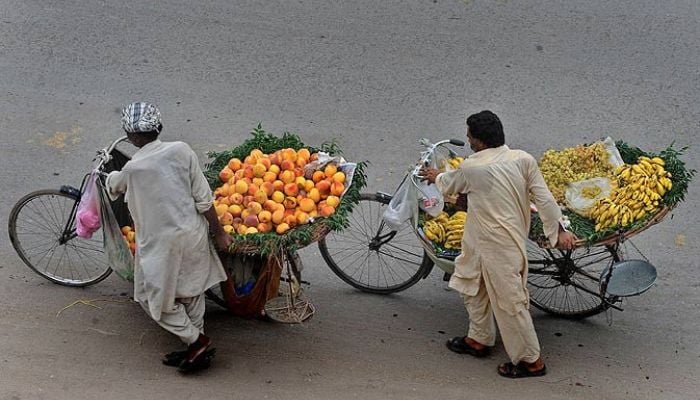Empower street vendors for sake of economy
Pakistan’s street vendor economy closely works with formal and informal supply-chain players and has a remarkable economic contribution, writes Nasir Iqbal
August 26, 2022

Pakistan has a large informal street economy occupied by individuals and micro-enterprises called street vendors (SVs), operating primarily in the country’s urban areas.
The street economy closely works with formal and informal supply-chain players and has a remarkable economic contribution. This sector, however, is the least explored as the government does not facilitate it, and it remains largely neglected and discouraged.
Street vendors face the challenge of poor legal protection, which makes them vulnerable to local authorities’ frequent eviction campaigns. This is why street vendors remain apprehensive about the absence of vending licences. Even high-earning vendors at shop fronts with little bargaining power are exploited by shopkeepers with an arbitrary increase in rent. Local authorities also exploit the illegal status of vendors and earn rent from street vendors. The lack of legal protection leads to harassment, confiscations, and arbitrary evictions (Roever, 2016).
Street vending, despite the government’s several attempts to eliminate it, has thrived due to high demand from a massive low-income population that benefits from the purchase of cheap goods provided by street vendors. Street vending is a major source of revenue for poor urban inhabitants.
Moosvi (2021), in ‘Street Vending: An Introduction and Overview’ states that nowadays, clearing street vendors from public spaces is a norm of local municipal authorities in Pakistan. Still, the strategy does not succeed in permanently getting rid of street vendors because of simple economics. The vendors exist to bridge the gaps in the market for those consumers who cannot get the service/product from the shop because of higher prices due to fixed costs.
Due to the frequent eviction of street vendors, it is vital to highlight the economic costs of informal street vending to develop and formalize the street economy.
The Pakistan Institute of Development Economics (PIDE) funded a research study titled ‘The Street Economy in Twin Cities: An Economic Analysis’ through a competitive grants programme called the Research for Social Transformation and Advancement (RASTA). The study estimates the cost of the informality of the street vending business in Islamabad.
The study shows that only two per cent of SVs have licences to operate in the market. This implies that 98 per cent of SVs work without legal protection. The illegal status of SVs impels the local administration to confiscate their stock and evict the street vendors. The analysis shows that 65 per cent of SVs face eviction and around 25 per cent of evicted street vendors get a receipt of the confiscated stock. This indicates that a majority of street vendors do not get any legal documents as evidence to claim their confiscated goods.
Around 65 per cent of street vendors reported that their confiscated materials were never returned. This again shows massive exploitation by the local administration to extract rent from street vendors. The majority of SVs reported that their carts/tables were removed from the existing location. Only 39 per cent of SVs claim that their carts/tables remain intact after confiscation.
About 39 per cent of SVs mentioned that confiscation caused more than 50 per cent of their inventory, while 37 per cent claimed it caused a loss of inventory of between 25 per cent and 50 per cent. SVs who mentioned confiscation added that it took more than seven days to get back their confiscated materials. At the same time, the penalty imposed by the local government was around Rs1,500.
The study uses reported data on daily income to monetize economic losses due to confiscation. The total economic loss due to confiscation is around Rs71,000. The reported economic loss due to informality constitutes around 62 per cent of monthly revenues, which is 215 per cent of net monthly profits. This implies that a one-time eviction will lead to almost two months of net profit for SVs.
Moosvi (2021) states that anti-encroachment drives to force vendors into clearing the streets have never been practical. It only prompted them to move away temporarily, returning a day later. Merely getting rid of vendors and confiscating their assets without considering how the demand for their products will be met invariably leads to frustration on the part of consumers and violence and harassment in public spaces. This disturbing sight only fosters a fearful environment in the city rather than resolves any problems.
Haque (2019), in ‘Why Not KHOKHAS Everywhere?', highlighted that in the 1960s, hawkers and street vendors were the norm, and one could find them at every nook and corner, and they created vibrancy in the streets.
The economic analysis of street vending provides numerous insights for policymakers and other stakeholders. As noted, more than 98 per cent of SVs do not have legal protection to run their businesses. Illegality causes significant economic losses to street vendors. It is proposed that the local administrations introduce work permits for qualified street vendors annually to provide them with legal protection.
These permits generate revenues for the government and help standardise street vending products to ensure quality. Therefore, the ease and affordability of acquiring a licence is vital to encouraging legality in the street economy. The work permit may be renewed on a yearly basis after providing quality protocols.
The writer is associate professor at the Pakistan Institute of Development Economics (PIDE). He can be reached at: [email protected]
Originally published in The News











